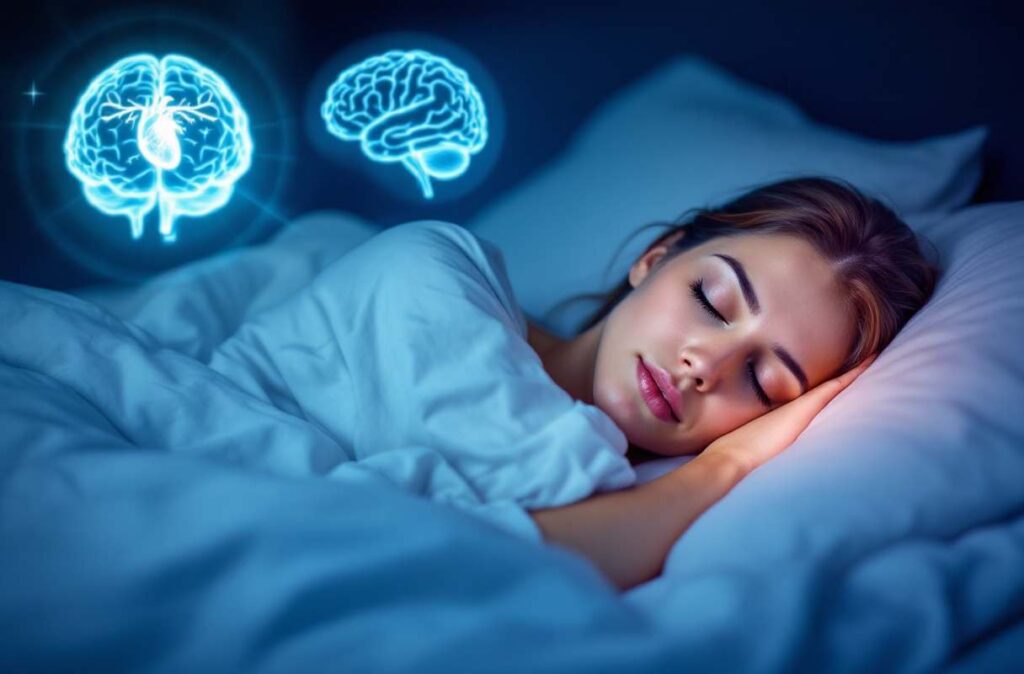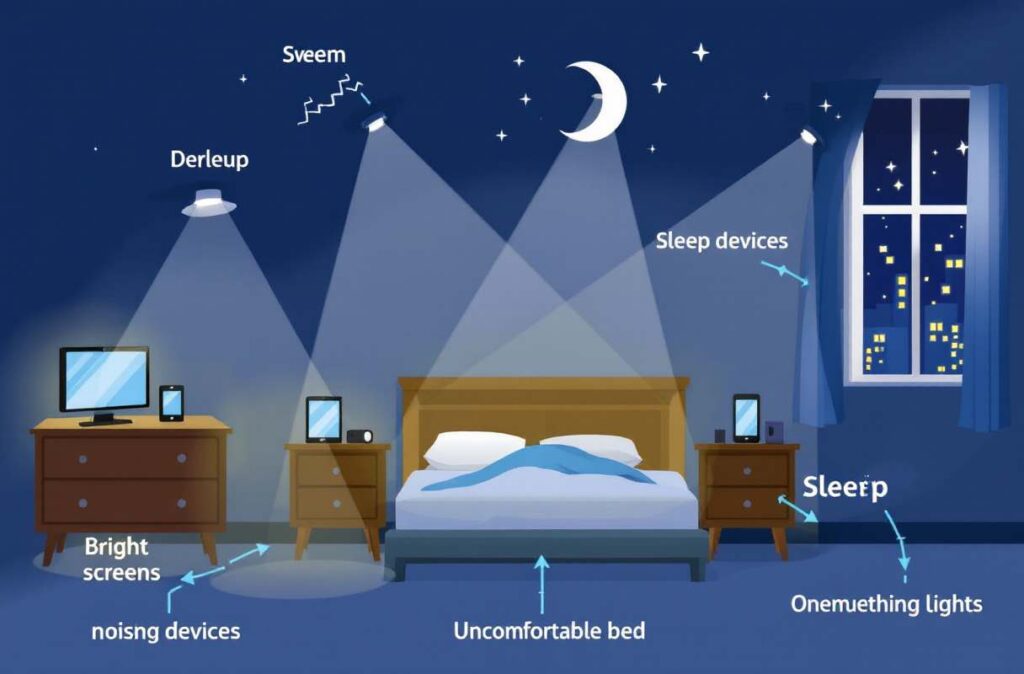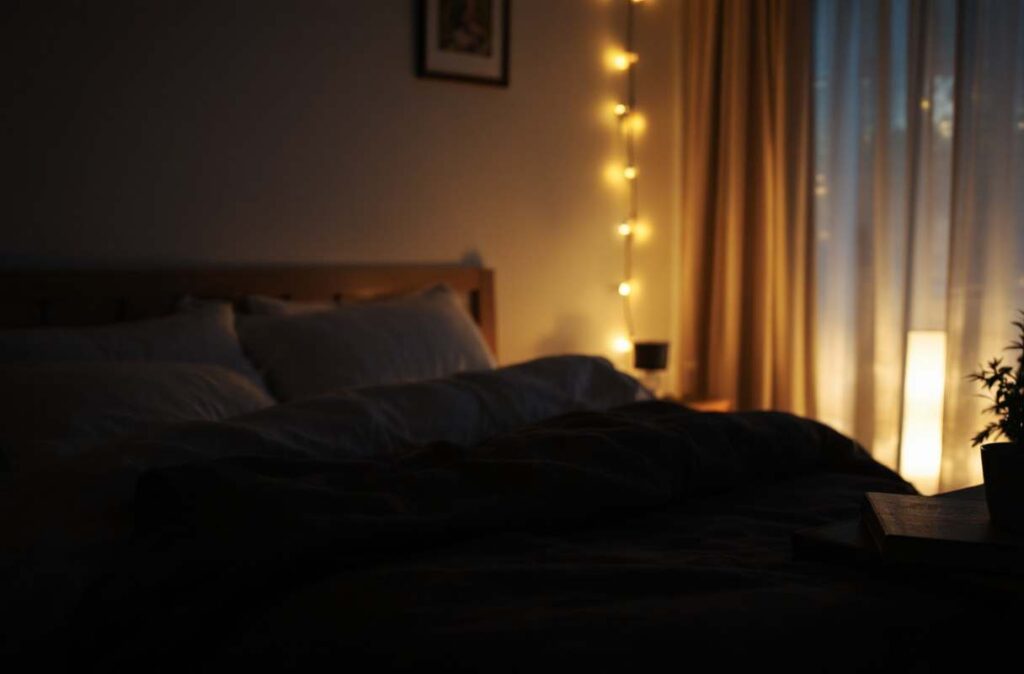Ever lie awake at night, staring at the ceiling, wondering why sleep feels so out of reach? You’re not alone. Quality sleep is like a secret superpower—it heals, rejuvenates, and energizes us. Yet, in our hustle-driven world, it’s often the first thing we sacrifice.
This article dives into why sleep is essential for your health, what’s stealing your slumber, and how you can reclaim restful nights to feel your best every day.
The Importance of Quality Sleep
Good sleep is the real MVP when it comes to keeping us healthy and sane. It doesn’t just keep our bodies running smoothly; it’s like a free therapy session for our emotions and gives our brains a boost too. Knowing how sleep and health buddy up can show us why missing out on Z’s is a bad trip.
Understanding the Impact of Sleep on Health
Think of sleep as a nighttime repair shop for our bodies and minds. When we’re snoozing, our insides are busy fixing up, growing new cells, and getting the hormonal gossip just right. Miss out on shut-eye, and you’re inviting a heap of health problems to crash the party.

Key Effects of Sleep Loss
| Where It Hurts | What Happens |
|---|---|
| Fighting Bugs | Your immune system starts playing hooky |
| Brain Stuff | Your brain turns into a potato, making it hard to focus or think |
| Mood Central | The grump monster wakes up, anxiety joins the dance floor |
Science says skipping sleep is like rolling out the welcome mat for tiredness, jitteriness, and irritability. Folks feeling the crunch might wanna dig into why not sleeping enough messes with your mood or how being an insomniac spirals into mental health issues.
“Sleep is the golden chain that ties health and our bodies together.” – Thomas Dekker
The Role of Sleep in Immunity and Mental Health
Getting solid snooze time is like giving your immune system a power-up. Studies say that if you skip on rest, your body might just wave a white flag when bugs come knocking.
Now, sleep is also your mind’s BFF. Ditching sleep can make you a magnet for downers like depression and anxiety. It’s like your emotional GPS goes on the fritz, making stress harder to shake off, and thinking straight becomes a chore.
| Mind’s Mood | Potential Problems |
|---|---|
| Being Sleepless | Cranks up stress, wrecks your emotional GPS |
| Brain Drain | Memory? Scrambled. Creativity? Dried up. |
Folks battling sleep loss should think about how it’s messing with both their bodies and minds. Getting hip to what bad sleep does can light a fire under improving bedtime habits. If you’re curious, check out our vibes on sleep loss and anxiety freakouts or how not sleeping drags down your work game.
Effects of Sleep Deprivation
Sleep deprivation is like a secret agent, stealthily wreaking havoc on your immunity and mental mojo. Getting clued up on what it really does might just highlight why those Zzz’s matter so much.

Immune System Function
Turns out, sleep is your immune system’s best buddy. Skimping on it leaves your defenses down, making you easier prey for germs and nasties. Studies show skimping on sleep can turn down the volume on cytokines—those crucial proteins that call the shots in immune responses.
Here’s a handy cheat sheet on how sleep keeps your immune system in check:
| Hours of Sleep | Immune Response | Germ Magnet Rating |
|---|---|---|
| 7-9 hours | Immune army ready for battle | Low |
| 5-6 hours | Soldiers on a snack break | Medium |
| Less than 5 hours | Immune army AWOL | High |
Basically, when you snooze right, you arm yourself to fend off illnesses like a pro.
Mental Health and Cognitive Functions
Missing out on sleep can make life feel like a never-ending bad reality show. It messes with your mood, making you moodier than a cat who missed breakfast. Anxiety, depression, and a whole host of mental gremlins lurk here. Plus, say goodbye to remembering where you left your keys—your brain’s attention and memory take a nosedive along with your shut-eye.
Here’s a snapshot of how sleep tinkers with your brain gear:
| Hours of Sleep | Messed-up Brain Gears | Mental Gremlin Risk |
|---|---|---|
| 7-9 hours | Smooth sailing; you might even remember birthdays | Low |
| 5-6 hours | Brain hiccups; memory-lapses galore | Medium |
| Less than 5 hours | Brain on holiday; hallucination headquarters | High |
Chronic insomniacs beware: lurking mood monsters await you, as our piece on chronic insomnia mental health risks points out.
Physical Health Consequences
Skipping sleep does a number on your body, not just your mind. Weight gain, bad ticker, and blood sugar issues can all come a-knocking when you’re short on shuteye. Lack of sleep throws off your hormone DJ’ing, messing with stress and hunger tunes.
“Your future depends on your dreams, so go to sleep.” – Mesut Barazany
Here’s a peek at the physical fallout of shortchanging sleep:
| Sleep Shortage | Body Backlash |
|---|---|
| 7-9 hours | All systems go |
| 6 hours | Extra pounds making friends |
| 5 hours or less | Welcome to the chronic condition club |
Ignoring sleep might start your body and brain on a downhill spiral. Understanding the sleep deprivation and anxiety link helps to tackle this sly saboteur.
Seeing what sleep deprivation does should be enough to make anyone a bedtime convert. By putting quality sleep high on your to-do list, you’re setting yourself up for a healthier, more balanced life that even the sandman would be proud of.

What’s Messing with Your Zzzs?
If you keep counting sheep but still can’t catch a wink, understanding why is key. There are quite a few culprits behind sleepless nights, including habits, your surroundings, and health hiccups.
“The Sleep Revolution: Transforming Your Life, One Night at a Time” by Ariana Huffington
Day-to-Day Shenanigans
How you roll through daily life can majorly mess with your snooze time. Here’s a look at common sleep stealers:
- Messy Sleep Schedules: All-nighters aren’t just for students. Shift workers and worn-out parents know all about the chaos of trying to snooze at odd hours.
- Late-Night Screen Binging: Phones, tablets, and laptops – that late-night binge sesh ain’t helping. The blue glow from screens can trick your body into thinking it’s daytime, messing with your sleep hormones.
- Caffeine Jitters: A latte too late, and you’re wide-eyed. Caffeine lingers longer than you think; that afternoon cup might still have you buzzing at bedtime.
- Couch Potato Syndrome: Not moving enough? Your body won’t be as eager to rest. A bit of exercise during the day can make a huge difference in getting that beauty sleep.
| Lifestyle Factors | Impact Level (1-5) |
|---|---|
| Messy sleep schedules | 4 |
| Late-night screen time | 5 |
| Caffeine jitters | 3 |
| Couch potato syndrome | 2 |
Curious about how lack of sleep can mess with your mood? Check out sleep deprivation mood disorders for the scoop.
Your Sleep Zone
The place where you catch those zzzs plays a big role in how well you do it. Look out for stuff like:
- Noise Pollution: Barking dogs, honking cars, or noisy roommates ring any bells? These can kill your snooze vibe fast.
- Too Bright: If your room’s lit up like Times Square, your body might just think it’s daytime. Dim it down for better shut-eye.
- Comfy or Not So Much: Got a bed that feels like bricks or a room hotter than a furnace? Not exactly the recipe for restful sleep. Cozy up your spot to get that sweet rest.
| Environmental Factors | Impact Level (1-5) |
|---|---|
| Noise pollution | 4 |
| Too bright | 5 |
| Comfy or not so much | 4 |
Want to turn your room into a sleep haven? Hit up sleep loss cognitive decline for some top tips.
Health Hiccups
Some health troubles like to play sleep spoilers, too. Here’s a peek:
- Sleep Struggles: Issues like insomnia or sleep apnea can keep you tossing and turning all night.
- Mind Matters: Anxiety or depression can keep you staring at the ceiling instead of snoozing. A look at the sleep deprivation & anxiety link might be enlightening.
- Painful Nights: Chronic aches make it hard to find comfort, making sleep elusive.
| Health Conditions | Impact Level (1-5) |
|---|---|
| Sleep struggles | 5 |
| Mind matters | 4 |
| Painful nights | 3 |
Figuring out how these factors mess with your sleep is the first step to catching those winks. Looking for a game plan? Check out chronic insomnia and mental health risks for a start.
Strategies to Improve Sleep
Feeling like a zombie every morning? Sleeping like a caffeine-fueled squirrel? We’ll help sort that out with some simple tricks to turn snooze time into dreamland without counting sheep all night. This piece is full of straightforward tricks that’ll have you catching z’s like a pro. Check out some methods to make sleep friendlier, both to your body and mind, along with suggestions for when it’s time to call in the sleep doctors.

Sleep Hygiene Practices
Got good sleep habits? If not, it might be time to swap out some late-night habits for those that make bedtime better.
| Sleep Habit | Why It Matters |
|---|---|
| Regular Bedtime | Keep bedtime and wake-up time consistent daily. Yes, even when Netflix tempts you to binge. |
| Put Down That Phone | Ditch screens an hour before sleep. Watching TikToks till midnight might mess with your snooze hormone. |
| Bye-Bye Caffeine | Say no to coffee and smokes in the evening. Trust us, your future sleepy self will thank you. |
| Unwind with Calming Stuff | Curl up with a book or meditate—your mind and body will get the hint. |
| Move it, Move it | Exercise during the day = Better sleep at night. Just don’t break a sweat too close to bedtime. |
These habits in your routine can make a big difference in taming issues related to sleep loss, the immune system, and mental health.
Creating a Sleep-Friendly Environment
Turn your bedroom into a sleep-friendly fortress. Little tweaks here and there can be game-changers!
| Sleep Setup | Suggestions |
|---|---|
| Keep It Dark | Blackout curtains or a cozy sleep mask can keep annoying light out. |
| Hush, Little Baby | Drown out disturbances with white noise or plug in earplugs. |
| Chill Zone | A cool room (60–67°F or 15–19°C) is the perfect snuggle temperature. |
| Cozy Bed | A good mattress and supportive pillows are like a hug from your bed. |
A sleep-friendly space boosts rest and helps keep sleep troubles at bay, especially for folks fighting chronic insomnia and mental health risks.
Seeking Professional Help When Needed
Tried everything but you’re still wide awake at 2 A.M., staring at the ceiling? Might be time to talk with a pro about your shuteye woes.
Signs it’s time for some expert advice include:
| Sign | What It Means |
|---|---|
| Chronic Insomnia | Can’t sleep or stay asleep for three months or longer? It’s bedtime battle time. |
| Snore Loud, Sleep Apnea Possible | Louder than a freight train and gasping for air? Waking up as tired as when you hit the hay? |
| Mental Woes | Anxiety or sadness hitching a ride with your sleep troubles? |
Seeing a specialist could lead to new strategies or treatments like cognitive behavioral therapy to better explore sleep’s role in your brain health or decision-making, as seen in articles about sleep deprivation and cognitive decline and sleep deprivation and decision making.
Managing Sleep Deprivation Symptoms
When you’re running low on sleep, it’s not just your mood that takes a hit—your immune system could use some extra TLC too. There are some nifty tricks to keep your defenses up and your brain in tip-top shape when the nights get too short.

Boosting Immunity with a Few Lifestyle Tweaks
Turning your lifestyle dial a notch can do wonders for your immune system if you’re missing out on Zzz’s. Just a smidge of tinkering here and there can make a sizable difference in keeping you healthy and sturdy.
| Lifestyle Change | Perk for Immunity |
|---|---|
| Regular Exercise | Gets the blood pumping, helps fend off the sniffles. |
| Balanced Diet | Loading up on veggies and vitamins C and D gives your immune system pep. |
| Hydration | Keep that water flowing—it’s the oil that keeps your body’s engine humming. |
| Stress Management | Chill with meditation and yoga to squash stress hormones that mess with your immunity. |
Trying out a few of these might make you less likely to call in sick, especially when sleep’s elusive. Want more tips on how to get your sleep debt under control? Check out our piece on sleep debt recovery strategies.
Mental Health Hacks for When Sleep’s Playing Hard to Get
Not enough sleep can mess with your mood. But don’t sweat it—find a few tricks to help when your brain’s foggy or frazzled:
- Mind Games (The Good Kind): Practicing mindfulness or simple relaxation moves like deep breaths can help knock anxiety back and lift your spirits.
- Stick to a Routine: Having some order in your day can make the world feel a little less chaotic when sleep’s not around.
- Friends & Fun: Catch up with your buddies or family to get that emotional ‘pick-me-up’ time.
- Cut the Tech Before Bed: Less screen glare before hitting the hay might just give your sleep a much-needed boost.
Knowing how missing sleep can stir up trouble upstairs is key to tackling these blues. Dive into our reads on sleep deprivation mood disorders and sleep deprivation anxiety link for the full scoop.
Reaching Out When Sleep’s a Nightmare
If sleep probs get too daunting, shouting for a little help ain’t a bad call. Experts can pinpoint what’s up and help you deal with the ripple effects of missed shut-eye.
- Talk It Out: Chatting with therapists can unearth ways to manage stress and emotions better.
- Sleep Pros: Persistent sleep issues got you down? A sleep specialist can help figure out what’s wrong, whether it’s insomnia or something sneaky like sleep apnea.
Seeking expert advice can spare you from the long-term hiccups of sleep deprivation, like memory slips or mood swings. Discover more in our pieces on chronic insomnia mental health risks and microsleep dangers mental health.
By giving your lifestyle a tweak, strengthening your mental resilience, and asking for help when needed, you’re not just fighting the sleepies—you’re also refreshing your mind and immunities.
Conclusion
Sleep isn’t just a nightly pause; it’s a critical component of a healthy, happy life. From strengthening your immune system to boosting mental clarity, quality sleep impacts every aspect of your well-being. Understanding what disrupts your sleep and implementing strategies like proper sleep hygiene and seeking professional help when necessary can transform your nights—and days. So, tuck in these insights and prioritize your rest; your body and mind will thank you.
FAQs
- Why is quality sleep so important for overall health?
Quality sleep allows your body to repair itself, supports brain function, boosts immunity, and maintains emotional well-being, making it essential for overall health. - What are common factors that disrupt sleep?
Irregular sleep schedules, excessive screen time before bed, caffeine consumption late in the day, a poor sleep environment, and underlying health issues can all disrupt sleep. - How does sleep deprivation affect mental health?
Lack of sleep can lead to mood swings, increased anxiety and depression, reduced cognitive function, and impaired decision-making. - What strategies can improve sleep quality?
Practicing good sleep hygiene, creating a restful environment, maintaining a consistent sleep schedule, and limiting caffeine and screen time before bed can improve sleep quality. - When should I seek professional help for sleep problems?
If sleep issues persist for more than a few weeks, affect your daily life, or are accompanied by symptoms like loud snoring or breathing interruptions, it’s advisable to consult a healthcare professional.
Additional Resources and Authority References
- National Sleep Foundation: Healthy Sleep Tips
- Centers for Disease Control and Prevention: Sleep and Sleep Disorders








